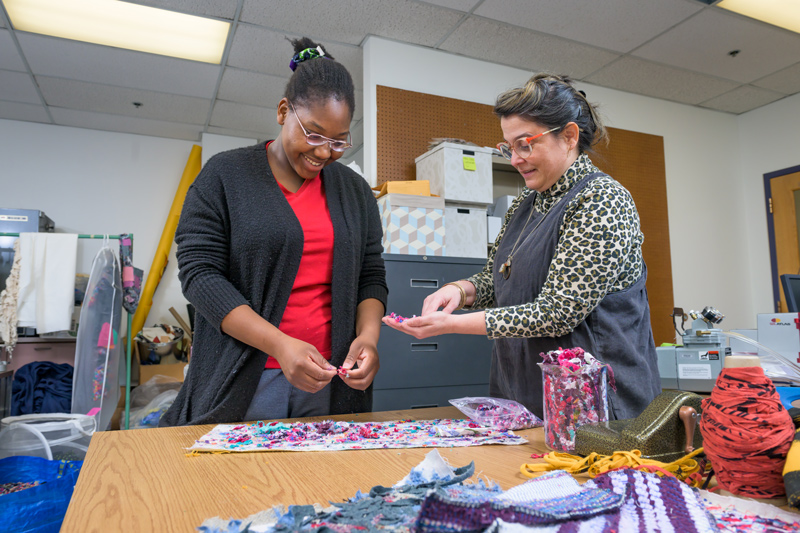
Kedron Thomas
Education
- Ph.D. – Harvard University
Biography
Kedron Thomas, Ph.D., is an associate professor with the Department of Anthropology at the University of Delaware. She is a cultural anthropologist with interests in the globalization of trade and legal frameworks, cultural and ethical dimensions of entrepreneurship and business, the production of material culture, and the cultural politics of style and identity, race and ethnicity, and environmental sustainability. She examines these processes and practices in the context of the global fashion industry.
Thomas earned a Ph.D. in social anthropology from Harvard University in 2012. Before joining the University of Delaware, she was associate professor of anthropology at Washington University in St. Louis.
Research Interests
Thomas' research on clothing and fashion spans traditional textile production in the Guatemalan highlands, the manufacture and circulation of “knockoff" fashions in Central America, and the efforts of fashion industry professionals in the United States and United Kingdom to address pressing problems of environmental degradation and labor exploitation associated with global apparel supply chains.
Her first book, Regulating Style: Intellectual Property Law and the Business of Fashion in Guatemala (University of California Press, 2016), is based on long-term research with indigenous Maya apparel manufacturers who make clothing that features unauthorized reproductions of fashion brands. She examines the rise of “knockoff" fashion in Central America amidst the politics of race and indigeneity, efforts by the Guatemalan state and international institutions to promote entrepreneurship and national development after nearly four decades of armed conflict, and the globalization of intellectual property regimes that criminalize practices of brand “piracy." The book also broadens out to explore the neocolonial contours of the global fashion system. She argues that trademark law enforcement is an important part of how the fashion industry regulates style along the lines of race, class, gender and geography.
Her ongoing research in Latin America extends to the forms of moral and legal reckoning that hold sway in indigenous communities and the efforts of nation-states to regulate economic practices that are disparaged as illegal and informal. She has edited a set of collections on these topics, including special issues of Latin American Politics and Society, Critique of Anthropology, and PoLAR: Political and Legal Anthropology Review. In a co-edited volume entitled Securing the City: Neoliberalism, Space, and Insecurity in Postwar Guatemala (Duke University Press, 2011), she examined state and community-level responses to mounting insecurities and widespread impunity for violent crime in Guatemala in relation to processes of economic and legal reform.
Her current book project describes the politics of environmental sustainability and labor rights from the perspectives of designers, marketers, and brand and supply chain managers at fashion and footwear firms in London, San Francisco, and Portland, Oregon. Tentatively titled, Sustainability in the Making: Labor, Ethics, and Ecology in the Global Fashion Industry, the book narrates how people who work in the fashion and footwear industry are attempting to build more environmentally sustainable and ethical supply chains. Rather than gauging the economic or ecological efficacy of these efforts, her research has focused on the ways that evolving business strategies reflect the emergence of new and different social identities, relationships to materials and technologies, moral sentiments and commitments, and meanings of work and labor among white-collar employees. The project engages conversations on material culture and materiality, ecology and environmentalism, the meaning and practice of sustainability, changing urban landscapes and processes of gentrification, corporate ethics, and cultures of contemporary capitalism.
Select Publications
2022 Futurity beyond the State: Illegal Markets and Imagined Futures in Latin America. Latin American Politics and Society. First View, Pp. 1-23 (with Matías Dewey).
2020 The Piracy Problem: Indigeneity, Hybridity, and the Racial Politics of Intellectual Property Enforcement in Guatemala. In Piracy and Intellectual Property in Latin America: Rethinking Creativity and the Common Good. Juan Poblete and Victor Goldgel-Carballo, eds. Pp. 37-55. London: Routledge.
2020 Cultures of Sustainability in the Fashion Industry. Fashion Theory 24(5): 715-742.
2017 Intellectual Property Law in Comparative Perspective: The Case of Trademark “Piracy" in Guatemala. In Comparative Law and Anthropology. James Nafziger, ed. Pp. 430-461. Camberley, UK: Edward Elgar.
2015 Ethics, Evaluation, and Economies of Value Amidst Illegal Practices. Critique of Anthropology 35(1): 3-12 (with Cristiana Panella).
2015 Economic Regulation and the Value of Concealment in Highland Guatemala. Critique of Anthropology 35(1): 13-29.
Resources and Links
-

Keeping it local
April 19, 2023 | Written by Karen B. RobertsUD researchers explore ways to reduce textile waste, spur local economy -
How I Teach — Anthropology
April 10, 2023 | Written by Ann ManserProfessor Kedron Thomas helps students explore cultures while boosting their academic skills

